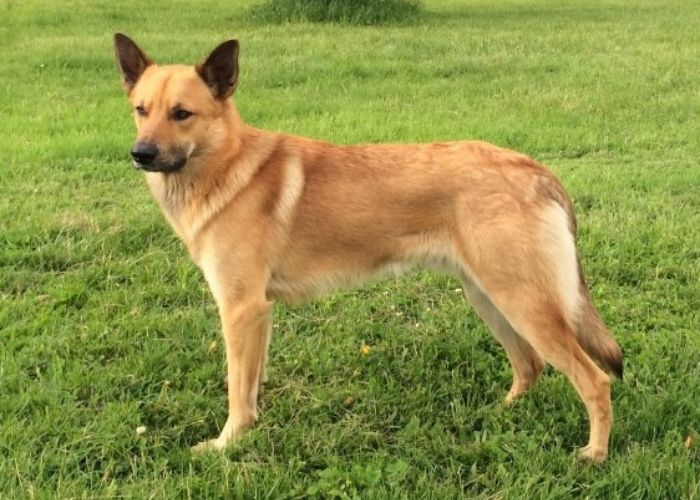The Chinook dog is adored by dog enthusiasts worldwide for its kind nature and stunning good looks; it is a rare and cherished breed. The Chinook, a breed developed by Arthur Treadwell Walden in the early 20th century, is famous for its amiability, intelligence, and flexibility. Discover the fascinating world of the Chinook’s temperament in this comprehensive guide. We’ll go over its unique traits, normal behaviours, and whether it makes a good working dog or a friendly house companion. Let’s read below “Chinook Dog Temperament”

Origin and History
Arthur Treadwell Walden of New Hampshire, USA, was the first to breed the Chinook dog in the early 1900s. Walden, an experienced explorer and dog driver, set out to create the perfect sled dog breed—one that could pull heavy sleds over long distances without losing its kind demeanour or mild temperament.
Walden crossed a Mastiff-type male with several northern and spitz-type dogs, including Belgian Sheepdogs, German Shepherds, Canadian Eskimo Dogs, and others, all with the goal of producing a healthy and hardy dog. Offspring with the admirable traits of friendliness, endurance, and power gave rise to the Chinook breed.
In the North American north, the Chinook was a beloved worker dog thanks to its stellar reputation in sled dog racing and cargo pulling. The tiny Chinook was on the verge of extinction not long ago, but dedicated breeders have battled valiantly to ensure the breed’s continued existence.
Chinook Dog Physical Characteristics
The medium- to large-sized Chinook is an energetic and powerful canine breed, perfect for pulling sleds and other big loads. The following are some notable external characteristics of the breed:
- Size: Chinook adults can grow to be as big as 90 pounds and 21 to 27 inches tall, with males often being bigger than females.
- Coat: A Chinook’s thick, double-layered coat serves to ward off the elements, whether it is snow or rain. An exterior coat that is smooth, straight, and somewhat coarse hides an undercoat that is soft and insulating. Chinooks can be any of several colours, including gold, tawny, sable, and silver.
- Head: A large and proportional beak, a relatively sharp stop, and a gradually narrowing muzzle are characteristics of a Chinook’s head. These eyes are very inviting and perceptive, with their almond shape and deep chocolate hue. These medium-sized, slightly spaced, trapezoidal ears slope forward when the animal is alert.
- Body: Chinooks are stocky with a level topline, a deep chest, and strong, straight legs. A dog’s tail, which is carried in a mild curve or sickle shape, may be slightly lifted from its moderately high posture when the dog is attentive or disturbed.
Chinook Dog Temperament
Below, you will find more information regarding the temperament of Chinook Dogs:
Affectionate and Gentle
One of the most noticeable things about the Chinook is its kind and friendly temperament. These dogs have become famed for their friendliness and the strong bonds they form with their human families. As pets, they are devoted to their owners and constantly seek out physical contact.
Intelligent and Trainable
Chinooks are very intelligent and versatile dogs who are a joy to train. Their amiability and receptivity to positive reinforcement training techniques (such as praise, treats, and play) make them ideal pets. Dog sports such as agility, obedience training, and retrieval benefit greatly from their high level of intellect and drive to please.
Sociable and Friendly
Chinooks are extremely sociable dogs since they like being in the company of both humans and other animals. Because of their sociability and friendliness, they make wonderful pets for households that host a lot of visitors, children, or other animals. As gregarious species that flourish in human presence, chinooks enjoy to be a part of family holidays and activities.
Calm and Even-Tempered
Despite their working-dog heritage, Chinooks are recognized for their placid demeanor and lack of aggression. Their placid nature and want to please make them wonderful pets in any environment, whether you’re in the city, the suburbs, or the country. The Chinook is an adaptable dog breed that may thrive in a variety of environments.
Protective Instincts
Despite their friendly and sociable nature, Chinooks are excellent watchdogs due to their protective instincts. They have excellent awareness of their surroundings and will alert their owners right away if they notice anything out of the ordinary. Chinooks aren’t meant to be guard dogs, but they’ll let their owners know if they feel threatened by barking.
Versatile Working Dog
Chinooks are fantastic working dogs for a wide variety of tasks, including sled dog racing, logistics, search and rescue, therapy and assistance dog employment. Because of their intelligence, strength, and stamina, they would be an asset to any team in any industry.
Bonding with Your Chinook
Getting to know your Chinook well is essential to have a fulfilling relationship with them. Here are some things you may do to strengthen your bond with your dog:
Spend Quality Time Together
Plan regular walks, games, and training sessions to keep your Chinook active and engaged. This quality time together will help your dog and you develop a strong bond by teaching each other important life lessons like respect and trust.
Provide Mental Stimulation
A Chinook’s mind will stay sharp and active with the help of puzzle toys and other enrichment activities. If you want to engage your dog’s natural intelligence and problem-solving skills, consider scent work or obedience training.
Establish Routine and Structure
Chinooks are creatures of habit and do best with structure, so it’s important to keep your feeding, exercise, and training schedule consistent. Keeping your house in order and regularly rewarding your dog for good conduct will help your dog feel more comfortable.
Practice Positive Reinforcement
Use positive reinforcement tactics, such as praise, treats, and love gestures, to reward good behaviour and promote desired habits. The use of punishment in dog training is counterproductive if you value the bond and trust you share with your pet.
Be Patient and Understanding
Chinooks flourish under the care of people who are patient and kind. Be patient, firm, and fair while your dog learns new behaviours and skills. Building a strong bond with your Chinook may be difficult at first, but it will be worthwhile in the end.
Conclusion
Last but not least, the Chinook dog is a friendly, loving, smart, and adaptable breed that has a stellar reputation for hard labour and dedication to its job. Chinooks bring joy and companionship to anyone’s life who welcomes them, whether they’re a family pet or a dedicated employee.
By familiarising yourself with the unique temperament traits of Chinooks and making every effort to strengthen your connection with your pet, you can ensure that your relationship with your Chinook is filled with joy and purpose for the years to come. You will be captivated by the Chinook’s charming demeanour and unwavering loyalty whether you are an experienced dog parent or considering a new addition to your family. I hope you like reading “Chinook Dog Temperament”.

Dr. Katie Lawlor is a seasoned expert in pet care with over 8 years of experience dedicated to enhancing the well-being of pets and their families. As a passionate advocate for animal health, Dr. Lawlor combines her extensive knowledge with a compassionate approach, offering valuable insights and practical advice on pet wellness. Her commitment to improving the lives of pets and their owners is reflected in her engaging content on PetPawsitively .com. Follow Dr. Lawlor’s work and connect with her on Instagram for expert tips and support.

